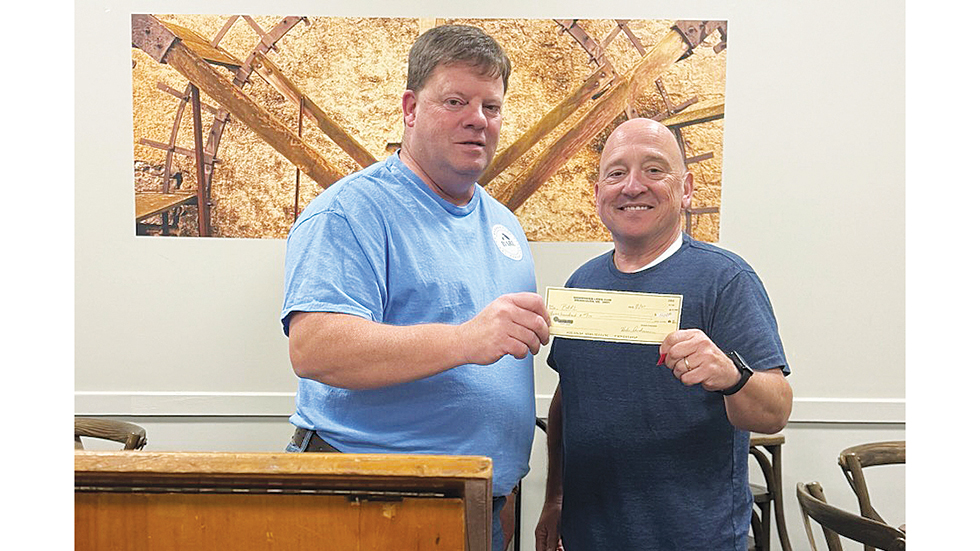Area mental health services in jeopardy without state funds
Published 5:00 am Monday, July 13, 2009
Lincoln County’s three Southwest Mississippi Mental HealthComplex facilities are enjoying their most successful year since2005, but officials said a funding crisis facing community mentalhealth centers statewide is threatening to derail that progress andpossibly cripple the private programs.
Dr. Steve Ellis, executive director of Community Mental HealthRegion 11 – which serves Lincoln and nine other counties – saidlocal facilities would have to terminate employees and programs andpossibly close if lawmakers don’t make a $22.5 millionappropriation to cover CMH’s statewide Medicaid match. He said thefunding was left out of the fiscal year 2010 budget and CMH can’tafford to pay it.
“If we can get the match monies in there, we’ll be fine,” Ellissaid. “We’re having probably the best year we’ve had financially infour years. But a lot of that is going to be dependent on thismatch money. If we have to incur that expense, we wouldn’t havebudgeted at the level we would be expected to pay.”
Trending
SWMMHC operates three facilities in Lincoln County – the LincolnCounty Mental Health Center, Lincoln County LifeSkills Center andthe Newhaven Recovery Center – which, along with 19 program sitesin Region 11, treat more than 4,500 people annually for mentalillness, retardation, emotional disturbances and drug and alcoholaddiction. In 2008, 1,191 Lincoln County residents were treated atthe centers, he said.
Ellis said the 22 programs in Region 11 have 125 employees.Lincoln County’s three facilities provided a $1,388,400 economicimpact from salaries and wages last year, he said.
But without $22.5 million to cover the facilities’ Medicaidmatch, those facilities are in imminent danger, Ellis said. Withoutthose matching dollars, he said the region could be forced to paybetween $900,000 and $1 million, a price the little-profitingcenters can ill afford.
“Up until fiscal year 2010, the state has always included somemoney in the state budget in Medicaid match for CMH,” Ellis said.”It hasn’t been sufficient … but there’s always been something inthere. We have never been faced with a situation, at least in mymemory, where there was no money budgeted like that.”
Several options for generating the needed funding exist, Ellissaid, few of which seem likely and none of which will be pleasingto the funds’ provider.
The Mississippi Department of Mental Health – which operatesalongside rather than over CMH – could cut the $22.5 million fromits more than $630 million budget, but doing so would likelyrequire the department to make cuts of its own.
Trending
The Legislature could increase counties’ millage requirementsfor CMH, Ellis said.
He said counties already contribute three-quarters of a mill tofund the programs, but those mills are based on property valuesfrozen by the Legislature in 1983. If the Legislature updates thelaw to reflect current property values, he said the millagecontribution would likely double.
Still, this is not a likely option, Ellis said.
On top of the millage rates, some counties in CMH regions alsomake allowances from local budgets. He said Lincoln Countyappropriates $10,000 on top of the millage requirements, for atotal of more than $52,000.
“It would be all-out war just about,” Ellis said. “(Supervisors)are already confronted with difficult economic times. We’retreading on ground that’s never been trodden before.”
Even if CMH could afford the Medicaid match on its own, Ellissaid there are legal questions about whether it would be allowed tomake the payment.
He said federal Medicaid requirements stipulate local matchingdollars be truly local, generated through local taxes, andorganizations are not allowed to send up federal dollars for afederal match. He said the situation is similar to the one thatbroke the state’s Medicaid system in 2005.
“The only entities that can be taxes are cities, states andcounties,” Ellis said. “So, the money has to come from somewherelike that that’s acceptable as genuinely local money.”
At this point, the least likely option is a legislativeappropriation. Gov. Haley Barbour has not placed the CMH fundingcrisis in any special session calls.
Members of the House passed a bill Friday that would refund MDMHfor covering the CMH match, but the bill immediately died in aSenate committee, where it was not taken up because it was outsidethe call for the session. Likewise, 57 representatives abstainedfrom voting on the bill.
“We passed it – of course it went to the Senate where itsummarily died a quick death,” said District 91 Rep. Bob Evans,D-Monticello, who has received calls for help from CMH officials inRegion 11. “I’m sure … they thought it was an illegal vote orsomething, but the Speaker (of the House) ruled it was within thecall.”
Evans said he has dealt with CMH services as a lawyer numeroustimes before, saying not paying for mental health and addictiontreatments on the front end will result in a financial burden onsociety.
Evans supports extracting the needed $22.5 million from theRainy Day Fund. He is against forcing MDMH to cover the costs.
“If you rob Peter to pay Paul, you’re not gaining anything,” hesaid.
District 92 Rep. Becky Currie, R-Brookhaven, abstained fromFriday’s vote. She believes MDMH should make the payment for CMH,saying the department would need to trim far less than the $22.5million needed from its budget in order to take advantage of a 5-1federal match.
“Out of their $630 million budget, I can’t imagine they can’tsend $7 million to the federal government, which will beimmediately wired back to them as $35 million,” Currie said. “Iwant to know why they can’t do that instead of taking money out ofthe Rainy Day Fund we’ll need to survive during the next fewyears.”
Currie, an outspoken critic of MDMH, said the department shouldconsider cutting “administrative luxuries and huge salaries” beforecutting personnel and programs.





